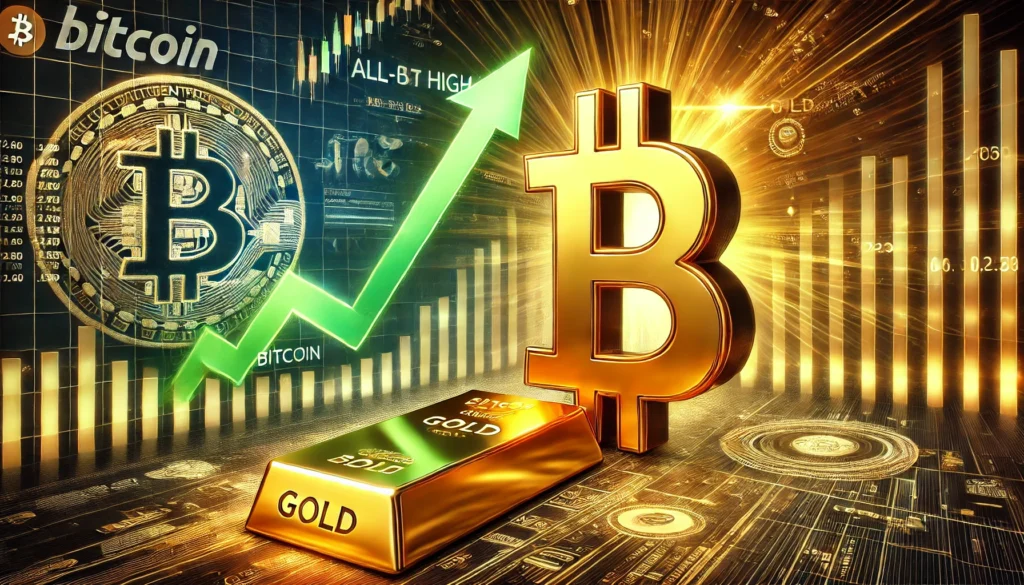For centuries, gold has been seen as the ultimate “store of value” — a safe haven during times of economic uncertainty. But in recent years, Bitcoin has been gaining attention as a new kind of store of value, one that’s digital rather than physical. Some even call it “digital gold.” But is it really fair to compare Bitcoin to gold, and can it truly live up to that reputation? Let’s break it down.
What Does It Mean to Be a Store of Value?
First, let’s clarify what we mean by “store of value.” Simply put, it’s an asset that holds its value over time, so you can save wealth in it without worrying about it losing worth. The classic example of this is gold. For thousands of years, people have trusted gold to preserve their wealth — even in times of economic chaos. Gold’s scarcity, durability, and the fact that it doesn’t degrade over time make it a pretty reliable bet.
But as the world shifts toward more digital economies, the question arises: Could Bitcoin, with its own unique characteristics, replace gold as a modern store of value?
Why Gold Has Been the Go-To Store of Value for Centuries
Gold has been the gold standard (pun intended) for storing value for a long time. Here’s why it’s been so trusted:
- Scarcity: There’s only a finite amount of gold on Earth, and it’s hard to mine more. This gives it a built-in scarcity, which helps protect its value.
- Durability: Unlike many things, gold doesn’t rust, decay, or lose its shine. It stands the test of time.
- Universality: Gold has been accepted as valuable across cultures and civilizations for thousands of years. It’s essentially the ultimate form of money.
- Tangibility: You can physically hold gold, which gives it an added layer of trust for many people.
Gold is not perfect, though. It’s heavy, not easy to transport, and storing large quantities can be expensive. Plus, its value still fluctuates based on supply and demand.
Bitcoin’s Rise: Is It the New Store of Value?
Bitcoin is a digital asset that operates on a decentralized network, meaning no single entity controls it. Unlike traditional money, Bitcoin is based on blockchain technology, which ensures its security and transparency.
Now, Bitcoin advocates like to call it the “new gold” for a few compelling reasons:
- Scarcity: Bitcoin has a hard limit of 21 million coins that can ever be mined. This is similar to gold’s natural scarcity, and many see it as a built-in protection against inflation.
- Digital Nature: Unlike gold, Bitcoin isn’t a physical asset. It’s stored digitally, which makes it easier to transfer and store. You can send Bitcoin to anyone with an internet connection, anywhere in the world, in just minutes. No need for physical vaults or shipping gold across borders.
- Decentralization: Bitcoin isn’t controlled by any government or central authority. It’s part of a peer-to-peer network of computers, making it a great hedge against inflation or any government manipulating currency.
- Hedge Against Inflation: Just like gold, Bitcoin is seen by many as a hedge against inflation. Its limited supply means it’s not subject to the same kind of inflationary pressures that affect regular currencies, which can be printed in unlimited quantities by central banks.

Bitcoin vs. Gold: How Do They Compare?
Let’s dig into how Bitcoin and gold stack up when it comes to being a store of value.
Scarcity and Supply
- Gold: There’s only a finite amount of gold in the world, and new gold is mined slowly. Gold’s scarcity is one reason it has been a stable store of value.
- Bitcoin: Bitcoin’s supply is capped at 21 million coins, which is even more finite than gold. Every 10 minutes, new Bitcoin is mined, but the process becomes harder over time, making the supply harder to increase. Bitcoin advocates love to point out that this scarcity is baked right into the system — a major reason it’s called “digital gold.”
Volatility
- Gold: Gold has its ups and downs, but generally, it’s been a pretty stable asset over time. Its price moves in response to big events — like economic crises or geopolitical tensions — but it doesn’t tend to swing wildly.
- Bitcoin: Ah, here’s the tricky part. Bitcoin has been wildly volatile. One day, it can be worth $60,000, and the next, it can drop to $30,000. This makes it exciting for traders and investors, but a little scary for anyone hoping for stability. Gold, by contrast, is less of a rollercoaster ride.
Liquidity and Transportability
- Gold: You can sell gold or trade it, but it’s not easy to move or divide. If you need to store a lot of gold, you’re dealing with physical vaults, and transporting it safely can be tricky and expensive.
- Bitcoin: Bitcoin is incredibly liquid. You can sell or buy it anytime, anywhere, and it’s as easy to move as sending an email. You don’t need to worry about physical storage or shipping — it’s all digital.
Security and Storage
- Gold: Gold is physical, so you can hold it in your hands, but you also need to worry about things like theft or loss. If you’re storing a lot of gold, you’re going to want a safe or a vault, which costs money to rent.
- Bitcoin: Bitcoin is stored in a digital wallet and secured with cryptographic keys. If you lose your key, you lose your Bitcoin — no one can help you recover it. On the flip side, it’s a lot easier to store and protect than a physical asset like gold. But it also means you’re solely responsible for your Bitcoin security.
Acceptance and Trust
- Gold: Gold has been trusted for thousands of years. Central banks hold reserves of gold, and it’s universally recognized as valuable.
- Bitcoin: Bitcoin is still relatively new, having only been around since 2009. While it’s gaining acceptance, it doesn’t yet have the same universal trust as gold. It’s also seen as more speculative, with its value highly influenced by things like market sentiment and regulation.
Can Bitcoin Really Replace Gold as a Store of Value?
While Bitcoin has some exciting advantages, it’s still a work in progress as a store of value. Its price volatility is a big issue for anyone looking for stability. Bitcoin has proven itself as a store of value in certain contexts — especially in countries with unstable currencies or economies — but it’s still too early to say if it will replace gold.
For one thing, Bitcoin’s relatively short track record — only around 15 years compared to gold’s millennia of history — means it hasn’t had the same time to prove itself during different economic cycles. And while its scarcity and decentralization make it an appealing alternative, its volatility and security risks are still challenges.
The Bottom Line: Will Bitcoin Become Digital Gold?
Bitcoin’s future as a store of value is still unfolding. It’s possible that it could evolve into a new kind of digital asset that exists alongside gold, rather than replacing it. Some investors are betting on it as a long-term hedge against inflation, while others remain cautious about its wild price swings.
For now, Bitcoin is carving out its space as an alternative asset, one that offers exciting potential but also comes with risks. As the world becomes more digital, Bitcoin could very well become an important part of the financial landscape — but whether it can ever truly replace gold as the go-to store of value is something only time will tell.




One Reply to ““Bitcoin as Digital Gold: Is It the New Store of Value?””